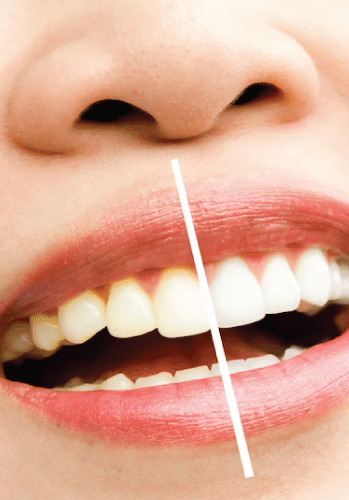Expert Root Canal Therapy in Hyderabad: Preserve Your Natural Tooth
Don't let toothache pain hold you back! Our expert endodontists at Park Dental Care in Hyderabad specialize in advanced root canal therapy to save your natural tooth. With a focus on comfort, precision, and long-lasting results, we'll get you smiling again in no time.


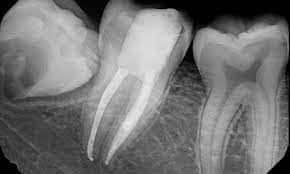
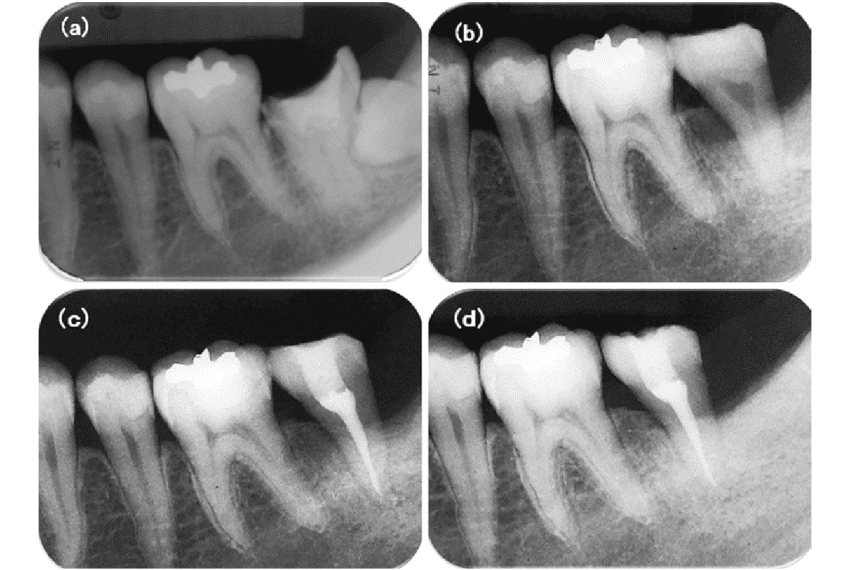
Dr. Rohita Sunkara and Dr. Harinath Bathini- Your Trusted Endodontist in Hyderabad
When it comes to exceptional root canal treatment in Hyderabad, you can trust the expertise of our highly skilled team at Park Dental Clinic. Leading this team are two distinguished endodontists, Dr. Rohita Sunkara and Dr. Harinath Bathini, who are committed to ensuring your dental health and comfort through top-notch pre and post-operative care. In this guide, we'll provide you with all the information you need regarding root canal treatment in Hyderabad.
Why Does Root Canal Treatment Have a Bad Reputation?
Many people associate root canal treatment with unbearable pain and discomfort. This reputation, however, is largely based on misconceptions. Root canals are often perceived as more invasive and painful than they actually are.
Pain-Free Root Canals at Park Dental Clinic
At Park Dental Clinic, we understand the concerns related to root canal pain. In the presence of severe infection, local anesthesia might take longer to work, and slightly more anesthesia might be required. Rest assured, we take the extra time to ensure the anesthesia is fully effective before proceeding with the root canal. Early diagnosis is vital to a pain-free experience.
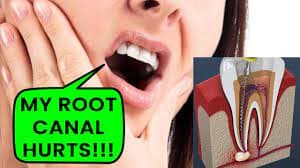
What Is a Root Canal?
A root canal is a dental procedure designed to remove a dead or infected nerve from the root of a tooth. Root canal, often referred to as endodontic therapy, is a dental procedure that aims to rescue a tooth that is in a dire state of infection or inflammation. The central part of your tooth, called the pulp, contains nerves, blood vessels, and connective tissue. When this pulp becomes infected or inflamed due to factors like deep cavities, trauma, cracked teeth, or failing previous dental work, it can lead to excruciating pain and pose a significant risk to your overall dental health.
The infected or inflamed pulp is carefully removed during a root canal, and the tooth's interior, including the root canals, is meticulously cleaned and disinfected. Once this is done, the empty space within the tooth is filled with a biocompatible material, and the tooth is sealed. It relieves pain and discomfort and allows you to keep your natural tooth, preserving its functionality.
Why Would I Need a Root Canal?
Root canals are necessary when the dental pulp within a tooth is compromised, often due to infection or inflammation. Some of the common reasons for needing a root canal include:
- Tooth Decay: Advanced cavities can extend deep into the tooth, reaching the pulp and causing infection or inflammation.
- Dental Trauma: Accidents or injuries that damage a tooth can lead to pulp damage.
- Cracked or Chipped Teeth: The pulp can be exposed or injured when a tooth sustains a severe crack or chip.
- Lost or Failed Fillings: If a dental filling becomes lost or deteriorates over time, it can expose the inner pulp to infection.
- Previous Root Canal Complications: Occasionally, a tooth with a prior root canal may require retreatment due to new infections or complications.
- Idiopathic Reasons: In some cases, the exact cause of pulp infection or inflammation remains unclear and is referred to as idiopathic.
- Periodontal issues: Gingivitis and periodontitis cause gum inflammation, bleeding, and recession due to plaque.
- Exposed roots: Gum disease can expose tooth roots, making them vulnerable.
- Root caries: Exposed roots are at risk of cavities (root caries) leading to pain and infections.
- Food trapping: Gum recession creates pockets for food and bacteria, increasing the risk of cavities and infections.
Signs and Symptoms of Needing a Root Canal
Toothache or Spontaneous Pain: One of the most common and noticeable signs that you may need a root canal is a persistent toothache or spontaneous pain. This pain can range from mild discomfort to severe, throbbing pain. It often occurs without any apparent cause and may worsen with pressure or temperature changes.
- Sensitivity to Hot and Cold: If you experience heightened sensitivity to hot and cold temperatures, it could be a sign of nerve inflammation or infection within the tooth. Drinking a hot or cold beverage may trigger sharp, shooting pain or discomfort.
- Swelling of the Gums: Inflammation and infection within the tooth can cause swelling in the surrounding gums. This swelling may be localized to the specific tooth or extend to adjacent gum tissue. The affected area may appear red and tender to the touch
- Draining Sore on the Gums: In some cases, a dental abscess may form, leading to the development of a draining sore on the gums near the affected tooth. This sore can discharge pus, have a foul taste, and may provide temporary relief from pressure, but is not a permanent solution.
- Tenderness with Biting and Chewing: As the infection or inflammation progresses, you may notice increased tenderness when biting or chewing. This discomfort can make eating challenging and may lead to changes in your eating habits.
- Tooth Discoloration: A tooth affected by an infected or inflamed pulp may change colour. It can appear grey, dark yellow, or even black. The discolouration often becomes more noticeable over time and can impact the appearance of your smile.
- Discomfort of the Lymph Nodes: Infected or inflamed teeth can trigger a response in your body's immune system, leading to swollen and tender lymph nodes in the neck. This is the body's way of trying to fight the infection.
The Root Canal Diagnosis Process
Accurate diagnosis is crucial in determining whether a root canal is necessary. Our experienced dentists at Park Dental Clinic employ a thorough diagnostic process that includes: Clinical Examination: A comprehensive visual examination of the affected tooth, gums, and any existing dental work. X-Ray Imaging: When deemed necessary, x-rays are taken to provide a detailed view of the tooth's root structure, revealing any signs of infection or damage. Assessment of Referred Pain: Sometimes, the pain experienced may not originate in the tooth under examination. Our skilled dentists can distinguish between referred pain and the actual source of the problem, ensuring a precise diagnosis.


Anesthesia for Root Canals
Anesthesia is a crucial component of root canal procedures, as it plays a pivotal role in ensuring a pain-free and comfortable experience for the patient. Here's a closer look at how anesthesia is administered and why it is essential during a root canal:
Types of Anesthesia:
- Local Anesthesia: Local anesthesia is used most commonly during root canals. It is administered directly to the treatment site, numbing the tooth and the surrounding area. This ensures that you won't experience any pain during the procedure, as the nerve endings in the tooth are temporarily blocked.
- Sedation: Some patients may experience anxiety or fear when undergoing dental procedures, including root canals. In such cases, sedation may be combined with local anesthesia to help patients relax and feel more at ease. Various forms of sedation, such as oral sedatives or intravenous (IV) sedation, can be employed.
The Importance of Anesthesia:
- Pain Management: A root canal involves the removal of the infected or inflamed pulp from within the tooth, which would typically be very painful without anesthesia. The use of local anesthesia ensures that you remain comfortable throughout the procedure.
- Patient Comfort: Besides preventing pain, anesthesia helps patients feel at ease during a root canal. It minimizes any discomfort, pressure, or anxiety associated with dental treatments.
- Effective Procedure: Under anesthesia, dentists can perform the root canal more effectively and efficiently. It allows them to work with precision and complete the treatment with minimal disruption to the patient.
The Administration of Anesthesia:
Before starting the root canal procedure, your dentist will explain the type of anesthesia used and how it will be administered. The steps typically involve:
- Topical Anesthetic: A gel or spray containing a mild topical anesthetic may be applied to the treatment area, often the gum, to numb the surface and make the injection of local anesthesia more comfortable.
- Local Anesthetic Injection: A small, thin needle is used to inject the local anesthesia directly into the gum tissue near the affected tooth. You may feel a slight pinch or pressure during the injection, but it's usually well-tolerated.
- The onset of Numbness: After the injection, the anaesthesia takes a few minutes to take effect. You'll gradually begin to feel numbness in the treated area, ensuring you won't experience any pain during the root canal.
It's important to communicate with your dentist during the procedure. If you experience any discomfort or pain, your dentist can make necessary adjustments to ensure your comfort. They will also monitor your condition throughout the procedure to ensure the anesthesia works effectively.
It's important to communicate with your dentist during the procedure. If you experience any discomfort or pain, your dentist can make necessary adjustments to ensure your comfort. They will also monitor your condition throughout the procedure to ensure the anesthesia works effectively.
Root Canal Procedure
A root canal procedure can be broken down into several key steps:
Local Anesthesia: The process begins with the administration of local anesthesia to ensure that you remain comfortable and pain-free throughout the procedure.
- Tooth Isolation: A dental dam, a protective rubber sheet, is placed around the affected tooth to keep it dry and saliva-free.
- Removal of Decay: Any decayed tooth portions are removed to access the pulp chamber.
- Pulp Removal: The infected or inflamed pulp is carefully removed from the pulp chamber and root canals.
- Cleaning and Disinfection: The interior of the tooth is meticulously cleaned and disinfected to eliminate bacteria and prevent future infections.
- Filling the Canal: A biocompatible material fills the space in the root canals, ensuring that no bacteria can re-enter.
- Temporary fillings: are used when a second dental appointment is planned or to address immediate issues.
- Permanent fillings: often tooth-colored, provides a long-term solution for cavities.
Crowns may follow temporary fillings for added protection and stability in extensively damaged teeth.
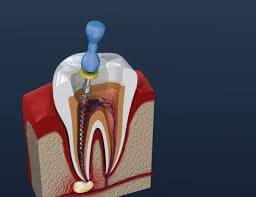
Do I Need a Dental Crown After a Root Canal?
Whether a dental crown is necessary depends on the tooth's condition and remaining healthy structure. Our experienced dentists in Hyderabad will determine the best course of action for restoring your tooth's strength.
Number of Visits for a Root Canal
Root canal treatment at Park Dental Clinic usually takes one to two visits, ensuring a quick and efficient process.
What to Expect After a Root Canal
After your root canal, you'll receive specific instructions. It's normal to experience mild soreness for the first 24 hours. You'll be advised not to chew on the treated tooth until a permanent filling is placed. Regular dental hygiene practices can be resumed, and antibiotics may be prescribed if necessary.
Longevity of Root Canal Treatment
One of the common questions patients often have is, "How long will a root canal last?" The good news is that for most cases, a well-executed root canal procedure should last a lifetime without complications. At Park Dental Clinic in Hyderabad, we take great pride in providing lasting solutions to our patients. Many individuals who had their root canals performed by our skilled team over 20 years ago are still enjoying their dental health and the benefits of their natural teeth.
The longevity of a root canal depends on several factors, including the following:
- Quality of the Procedure: A well-done root canal procedure, with thorough cleaning and sealing of the root canals, is more likely to last longer.
- Follow-Up Care: Following the procedure, it's important to adhere to any post-operative instructions provided by your dentist. Maintaining good oral hygiene practices, such as regular brushing, flossing, and dental check-ups, can help preserve the longevity of the root canal.
- Tooth Structure: The healthy tooth structure after the root canal plays a significant role in the tooth's strength and durability.
- Dental Restorations: The restoration used after the root canal, whether a dental filling, inlay/onlay, or a dental crown, can impact the longevity of the treated tooth.
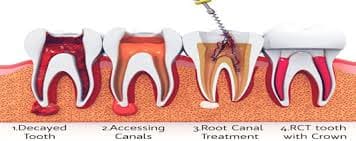
When to See a Root Canal Specialist (Endodontist)
While general dentists can perform most root canal procedures, there are cases when a patient's situation is more complex and requires the expertise of a root canal specialist, also known as an endodontist. When you visit Park Dental Clinic for an evaluation, our experienced team will determine if your condition necessitates specialized care. In such situations, we will refer you to a trusted endodontist to ensure the best possible outcome for your dental health.
Root canals can be a crucial step in saving your natural teeth and alleviating pain caused by dental issues. If you have concerns about your dental health or need a root canal, please don't hesitate to contact Park Dental Clinic in Hyderabad for a consultation. We're here to provide expert care and guide you towards a healthy and pain-free smile.
Why Choose Park Dental Clinic for Root Canal Treatment in Hyderabad?
We pride ourselves on our diagnostic accuracy, commitment to conservative and non-invasive approaches, and expertise in both simple and complex root canal procedures. Your health and comfort are our top priorities, and we always use the least toxic materials in our dental restorations.
Dental Treatments
Centered Around You
Every treatment plan is personally tailored around achieving long-lasting results.
Root Canal FAQ
The reputation of root canals as painful procedures is primarily based on misconceptions. Root canals can be comfortable, especially when caught and treated early.
A root canal's cost can vary, depending on several factors. We recommend contacting Park Dental Clinic for a personalized cost estimate.
Dental insurance coverage for root canals varies. It's best to check with your insurance provider or contact Park Dental Clinic for assistance.
We stand out as the best in Hyderabad due to our diagnostic accuracy, commitment to conservative treatment, and expertise in both simple and complex root canal procedures. Your comfort and health are our top priorities.
Modern root canal procedures are typically pain-free. The use of local anesthesia ensures that you won't experience discomfort during the procedure. If you have concerns about pain or anxiety, please discuss them with your dentist. They can provide additional options for relaxation and comfort.
Most patients can safely drive home after a root canal procedure as long as they feel comfortable and are not experiencing dizziness or any adverse effects from the anesthesia. However, arranging transportation if you have concerns or receive sedation during the procedure is a good idea.
You can generally resume eating once the local anesthesia has worn off, which typically takes an hour. It's advisable to start with soft, non-chewy foods and gradually progress to your regular diet as you feel comfortable.
For any further questions or to schedule a consultation, please don't hesitate to contact Park Dental Clinic in Hyderabad. We're here to provide the best root canal treatment and ensure dental health.
Schedule A Dental Consultation Today!
Click here to Book Appointment Now »
© 2025 All Rights Reserved.
Powered by KTree.


